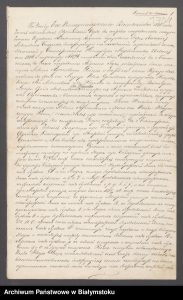Posts
One of the most underestimated groups of documents in genealogical research are notarial documents. While most of us focus on vital records, cemeteries, census lists, etc., notarial records seem to be something useless, or at least hard to obtain.
It is not true. Most notarial documents, if preserved, are kept by State Archives in Poland and are available for researchers. Of course, to be useful for research, they have to be indexed by surname, if not additionally by place. Imagine research in one yearly book of notarial office documents with about thousand documents written in russian Cyrillic, without knowledge about surnames and places. It is work for months, if not for years!
I am focusing mainly on the 19th century russian partition of Poland, but the same rule works in other parts of Poland.
Still many notarial documents are not indexed, and they have not been touched by genealogists’ hands for years. I saw such yearly books in the State Archive in Elk and Suwalki, which are waiting for the indexing team.
But some notarial documents have been indexed already. I mean notarial documents of Grodno Gubernia kept by the State Archive in Bialystok. The are known under the name “Older notary of Regional Court in Grodno” (Starszy Notariusz Sądu Okręgowego w Grodnie) and contain preserved notarial documents mainly from 1883-1915 period from Bialystok, Sokolka and Bielsk counties. These documents have been indexed by surname and place, so before visiting the State Archive in Białystok, you can check if documents containing your surname of interest are there. They were conducted in Cyrillic russian.
I have had several possibilities of research in these documents and can say that even a simple real estate sale document contains important information from a genealogy point of view. First, you nearly always get the information about the father’s name of the given person participating in the sale act. This information was part of russian transcription of names. Father’s name was part of it!
Second, very often you will get the information about addresses of people participating in the sale act. In many cases, detailed description of parcel, neighbouring parcels and their owners, dimension and buildings will be given.
Sometimes I have found more interesting documents among notarial ones, like wills, which very often give detailed information about the structure of a given family, their members and relationships.
But the most interesting one, I have ever found, was the property division document between members of the family. That 10-pages counting document gave very detailed information about two generations of a given family, who lived in Bialystok in the second half of XIXTh century. What was most important, my customer did not have knowledge about these two generations before.

First page of mentioned notarial document of property division
Summarizing, it is really worth looking at the notarial documents.
If you are interested, my services contain translation of Russian text of the original notarial document into english.

Leave a Reply |
|
COMMENT (Comment will appear on the site after approval by the administrator.) |
| E-MAIL (optional - your email address will not be published) NAME (optional) |
